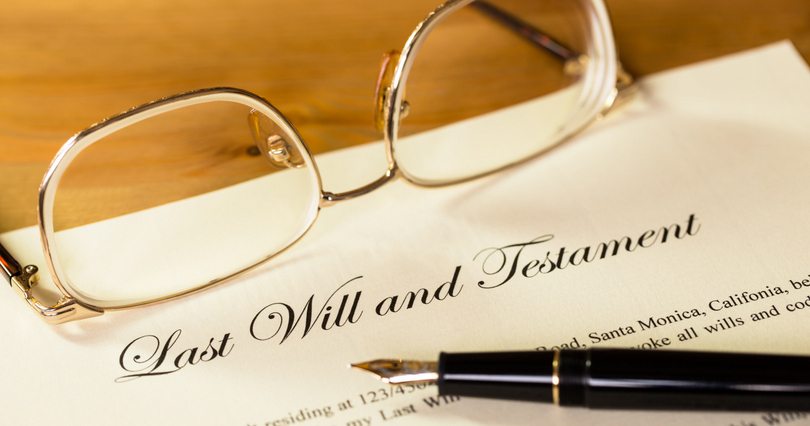Why You Need a Will?

A will is an important document. Why you need a will? A will enables an individual to indicate how his assets are to be distributed after he or she dies.Most of us are familiar with the concept of a ‘Will’, but we feel it is not significant unless we are rich or have huge assets to distribute. This is absolutely wrong.
Whether you have assets worth a few thousands, lakhs or crores a Will is still important to make sure that your assets pass on to the beneficiary or the right person to whom you want to pass on or distribute your assets.
Why you need a Will, is a question that often arises in our mind. The Will ensures that your beneficiaries get their dues without any hassles.
If you don’t have a Will, a court decides who the beneficiary of your assets is. But if the question arises why do i need a will then the answer if you have children, a will is a must, to ensure that you get to choose your children’s guardian.
Nobody can foresee when would he die and if one dies suddenly without a will, he would subject his dear ones to utter confusion at times of distress.
Generally we hear stories in our close family circles where the grandfather or the oldest member in the family writes a Will. Similarly, Bollywood and regional films are full of stories about property disputes and how people forge Wills or how a Will brings a twist to the whole tale.
But why you need a will,then the answer is, without a will, in most states, the laws of intestacy will limit the distribution of assets to parents, siblings, and children. They typically provide nothing to grandchildren and step-children.
If this sounds too filmy you should have definitely heard about a Will written by an elderly member in Birla family in favor of a person outside the family involving assets worth thousands of crores. How’s that?
Objective of a Will
A will is intended to make sure that your assets and belongings are passed on or distributed to your heirs as per your instruction. Why you need a will and when you write a will, you will be able to avoid:
- Delays in transfer of assets
- Disputes among legal heirs
Writing a Will
The procedure of writing a will is simple and straight forward, but it needs to be as specific as possible to avoid ambiguities. It can be written in a simple language without the use of legal jargon. There is no prescribed format, so a Will can be either hand written or typed.
Even a will which is written on plain paper is valid. So contrary to popular opinion a will need not necessarily be written on a stamp paper or be registered. A will should cover the following mandatory information so that it serves its purpose:-
- It should specify the testator (or the person who is making the will)
- Give a list of assets and
- Show how these assets would be distributed among the beneficiaries
These are the minimum requirements of a will, however one can include additional information wherever necessary. For instance the will could say that the assets can be passed on to heirs after fulfilling certain conditions. The conditions could be events such as marriage, having children, after a certain age, etc.
Madan’s father expired without leaving a will. The family’s worry further aggravated when they had to run from pillar to post to get various documents and proofs to get the shares transferred to his account.
Since there was no named nominee for the stocks he had to go around travelling or consulting with his brother and sister living in other cities to get the paper work done. The brokerage firm wanted to make sure that he is the only claimant to these funds in order to avoid complication later on.
Mr. Gupta’s family had a sudden shock when Akash Gupta, the head of the family suddenly expired due to heart attack. The heirs Mrs. Gupta and two kids had to face a lot of additional problems because a substantial amount of money and deposits in a bank could not be withdrawn.
The bank wanted various certificates, letter of indemnity, and more documents, but the process is not complete and they are not sure when they would receive their money and continue their normal life. Bankers try to play safe as they have to ensure that there are no other claims or disputes in future. Here the question of why you need a will certainly arises?
These are cases where lack of estate planning has resulted in putting the family in a pitiable position.
Nomination is Not the Solution
Many people think that appointing or choosing a Nominee for all accounts, investments, assets, etc will ensure that the ownership of these assets go the Nominee, which is not true in most cases. In pure legal terms a Nominee is only a custodian who is authorized to receive the proceeds, but not the owner of the sum.
Mr.Khattar who was a retired Central Government employee chose his wife as the Nominee for his investments including mutual funds and stocks. During his lifetime he wanted to sure that his wife is the sole owner of his assets because his children were married and financially well off too.
However, when he passed away things turned sour and the family members were fighting over their share of these investments. Mrs. Khattar ultimately got only a share of the assets, because according to law all legal heirs have rights to the assets.
Though Mrs. Khattar is the Nominee, she can only receive the assets or proceeds, but ownership rights are equally divided between wife and children in this case.
The Lesson
Mr. Khattar should have written a simple will specifically stating that his wife will the beneficiary of all his assets. This simple step could have saved his wife from the grief of being deprived her rights. The flaw here is the assumption made by Mr.Khattar that a Nominee would be the owner of the assets after his death.
Change To a Will
The good thing about a will is the option to make changes any number of times. A will may have to be changed due to change in circumstances, composition of family members, etc. Most people postpone or worry thinking that a Will cannot be altered, which is a misconception.
For instance a person may want to include his wife in the will after marriage. Or there may be a case where newly born kids and their needs have to the taken in to account.When there are changes to a will, then the latest will supersede all previous documents.
Registering a Will
Although registering a will is not mandatory, it can provide more authenticity to the will. The registration process can be done in the office of the sub-registrar of the district in which the testator (one who prepares the will) resides.
After registration, the will must be kept in the sub-registrar’s office. It can be modified only through notification through codicils which also have to be registered.
Surprise Elements in a Will
A will is definitely prepared with the best of intentions, but its simplicity and flexibility also makes it too complex and difficult to interpret at time. A few points which are actually contrary to what most people think are listed below:-
- A registered will can also be challenged in a court. A will does not get additional legal sanctity after registration.
- The will may name any person, not necessarily the legal heir, to receive assets or portions of the assets of the testator. This means the beneficiary could be a friend, a third party or anyone other than the legal heir as per the wish of the Testator.
- Ambiguity in language or other aspects and defeat the purpose of the will altogether. Some ambiguous items include:-
- Use of wrong words
- Use of words which have more than one meaning or interpretation
- Wrong combination of words or phrases
- Use of nick names
- Use of last names (which causes confusion)
- Use of first name (where two heirs have the same first name)
To avoid all these a will should be written in simple language and has to be reviewed or checked by a lawyer or legal expert. Consulting a legal expert is important because there could be a few changes or amendments to laws which we may not be aware of. It is very important for people with young children to have a will so as to be sure about the guardianship of minors.
Conclusion – Why you Need a Will?
All said and done there would still be a few skeptics who would still feel that they don’t need a will or can look at other alternatives. The notion that a will is required only at old age is absolutely false. Even a young adult with a small asset base needs to have a will in place to ensure that the assets are passed on to the right people without hassles.
A few people would argue that gifting assets or money during life time to one’s heirs would save them from all this trouble. This is sheer foolishness, because gifts are irrevocable, while a will can always be revoked or changed. When you give away all your assets then you are literally left with nothing, and have to be at the mercy of the beneficiaries.
This is the typical situation which most senior citizens face today, as rightly portrayed in the film ‘Baghban’ where Amitabh Bachchan and Hema Malini played the lead roles as an old couple.
So writing a will is definitely mandatory for anyone who has some assets to pass on after his or her demise. So, think about why you need a will and make sure you invest some time to think about how you want to pass on your assets and to whom and prepare a will. This will ensure that your beneficiaries get their dues without any hassles.









Leave a Reply